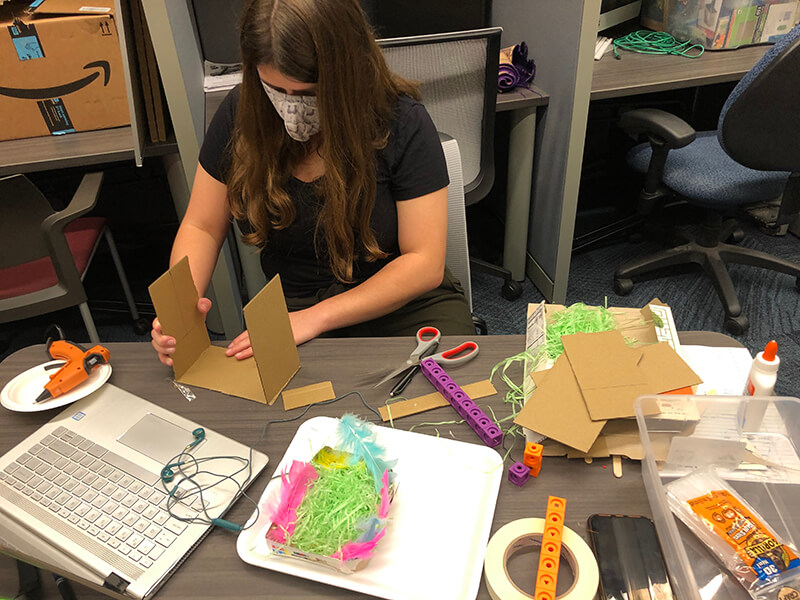December 7, 2020
Purdue students soon to become teachers learn to teach STEM with Engineering by Design

Elementary education major Rebecca Bryant works on a nest box as part of the Engineering by Design “Home Tweet Home” unit for young children. The program is designed to teach children science, technology, engineering and mathematics (STEM) more effectively by relating it to the world around them. (Photo provided)
WEST LAFAYETTE, Ind. — Let's say the first-grade students are learning about the concept of habitat, which, in their town, birds are losing to a construction project that they pass by on the way to school.
What do the birds need? They need a nest. So the students use arts and crafty materials to build one. Now they need a place to put it, like a birdhouse, which requires measuring to make sure the nest will fit and thinking about things like peaking the roof to let the rain run off. Suddenly, the kids are learning not only science but also some math and a bit of engineering as well.
In fact, they’re getting a lesson in all the elements of STEM – science, technology, engineering and mathematics. That’s the point of a program called Engineering by Design, which some Purdue students who are training to be teachers have worked this semester to include in their teaching toolkit.
The Center for Advancing the Teaching and Learning of STEM (CATALYST) at Purdue piloted a workshop for the prospective elementary school teachers to learn to teach through integrated STEM approaches using Engineering by Design, a unique model developed by the International Technology and Engineering Educators Association's STEM Center for Teaching and Learning.
The program includes an array of developmentally appropriate lessons for grades pre-kindergarten through 12, ranging from the birdhouse example to designing and building a “shake table” – using materials like straws, popsicle sticks, glue, cardboard, marbles and rubber bands – to study the concept of waves in the context of how structures are impacted by earthquakes.
By relating the project-based lessons to the world they see around them, the integrated STEM approach answers an age-old question heard from students: “Why do I have to learn this?”
"They need to understand why what they're learning is relevant to them," said Nathan Mentzer, an associate professor in the Purdue Polytechnic Institute, the College of Education and CATALYST, and a certified workshop leader for elementary Engineering by Design. He led Purdue’s workshop.
Engineering by Design workshops are usually for in-service teachers – already certified and working in the field. Purdue, which plans to continue and expand the program after this semester’s pilot, decided to offer the workshop to pre-service undergraduates because it promises to strengthen their knowledge, skills and practices for teaching STEM subjects, and also to enhance the employment prospects of the Purdue’s students.
“Teachers who complete the Engineering by Design workshop will be classroom-ready for meeting the objectives of Indiana’s STEM Strategic Plan,” said Lynn Bryan, director of CATALYST and a professor in the College of Education and College of Science. “For example, they will have experience teaching via problem/project/inquiry-based approaches to learning as well as have access to integrated, evidence-based STEM curriculum.”
The Purdue students will end up being certified in Engineering by Design, receive a year's membership in the International Technology and Engineering Educators Association and have access to all its resources, as will every teacher in any school system that hires them.
The students receive course credit for the workshop, which also serves as a capstone course for Purdue’s 21st Century STEM Teachers scholarship program, and their newly developed expertise will help put any Indiana school where they’re employed in line for the state’s STEM school recognition program.
The students, who get a small budget from CATALYST to purchase materials, started working in early September on lessons that they then practice-taught to each other before going out into schools to teach.
With the pandemic, the “going out” part was done virtually via Microsoft Teams. Some of the students have been teaching kids at Wea Ridge Elementary School in Lafayette and others kids at schools in New York and Pennsylvania. The students also have interacted virtually with mentors who are veteran Engineering by Design teachers from around the country.
Writer: Greg Kline, 765-426-8545, gkline@purdue.edu
Sources: Lynn Bryan, labryan@purdue.edu
Nathan Mentzer, nmentzer@purdue.edu

